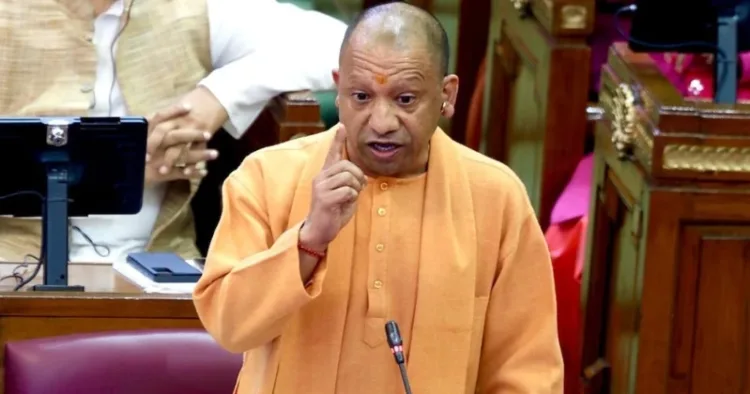Uttar Pradesh Chief Minister Yogi Adityanath, on the opening day of the four-day Assembly session, delivered a wide-ranging and hard-hitting address. Tackling allegations of communal violence in Sambhal and Bahraich, the Chief Minister defended the chanting of “Jai Shri Ram” during Hindu processions, questioned the selective criticism by opposition parties, and presented data to highlight his government’s success in maintaining law and order.
The Chief Minister raised critical questions about the recurrent nature of communal violence in the state, specifically during Hindu processions. “Why do flare-ups occur when Hindu processions pass through Muslim-dominated areas, whereas Muslim processions pass peacefully through Hindu areas?” he asked, challenging the opposition’s narrative.
Referring to the violence in Sambhal, CM Yogi noted the region’s troubling history of communal riots. “The history of riots in Sambhal dates back to 1947. In 1974, 184 Hindus were burnt alive. Since Independence, 209 Hindus have been killed in Sambhal. This violence has a pattern, and we must address its root causes,” he said.
Condemning the recent violence, he declared that those responsible would face strict action. “Who were the stone pelters? Whoever they are, they will not be spared,” he said, reaffirming his government’s zero-tolerance approach to communal unrest.
CM Yogi directed sharp criticism at the Congress and other opposition parties, accusing them of monopolising India’s cultural and historical narratives. Without naming specific individuals, he remarked, “Some people wander around with a self-proclaimed contract of representing India and treat Discovery of India as if it were the oldest book of this country.”
The comment was seen as a dig at the Congress’s portrayal of India’s history and the legacy of its leaders.
The Chief Minister highlighted a recent anti-encroachment drive in Sambhal that led to the reopening of a historic temple, which had been locked for decades. The mandir, containing an murti of Bhagwan Bajrang Bali and a Jyotirlinga, holds deep historical significance.
“This temple did not reappear overnight. It represents our enduring heritage and the truth of our history,” he said, emphasising the importance of preserving such cultural landmarks.
Yogi Adityanath also announced ambitious plans for the upcoming Prayagraj Mahakumbh, scheduled from January 13 to February 26, 2025. He revealed that while the event traditionally attracts around 40 crore devotees, arrangements are being made to accommodate up to 100 crore people, stating its global significance.
Responding to opposition claims that the BJP government had failed to curb communal violence, CM Yogi Adityanath presented data from the National Crime Records Bureau (NCRB). “Since 2017, communal riots in Uttar Pradesh have decreased by 97 to 99 percent. No major riot has occurred in the state under our administration,” he said.
Comparing his government’s record to previous regimes, the CM stated, “Between 2012 and 2017, under the Samajwadi Party, 815 communal riots took place, resulting in 192 deaths. From 2007 to 2011, during the BSP’s tenure, 616 riots were recorded, with 121 deaths. This data reflects our commitment to maintaining peace and harmony.”
CM Yogi launched another attack on Samajwadi Party (SP), describing it as a “production house of criminals.” He criticised SP legislators for staging protests outside the Vidhan Sabha, accusing them of politicising communal violence.
Holding placards blaming the BJP for recent riots, SP members alleged that the government had failed to uphold communal harmony. The CM dismissed these claims, calling them baseless and politically motivated.
Defending his government’s record, CM Yogi Adityanath presented data from the National Crime Records Bureau (NCRB). “Since 2017, Uttar Pradesh has seen a 97 to 99 percent decrease in communal riots. No actual riot has occurred in the state since 2017,” he asserted.
Comparing this to previous regimes, he said, “Between 2012 and 2017, during the Samajwadi Party’s tenure, 815 communal riots occurred, claiming 192 lives. From 2007 to 2011, under the BSP’s rule, 616 riots were recorded, with 121 deaths. This contrast underscores the effectiveness of our government in maintaining peace.”
Reiterating his stance on the “Jai Shri Ram” slogan, CM Yogi Adityanath defended it as a symbol of faith and devotion. “This slogan is not provocative. It is a part of our cultural heritage. People greet each other with ‘Ram Ram.’ Even during funeral processions, we chant Bhagwan Ram’s name. How can this be communal?”
Drawing a parallel, he asked, “If tomorrow I say I don’t like the slogan ‘Allahu Akbar,’ will you agree with me? Mutual respect for religious expressions is essential.”
The Chief Minister concluded his address by asserting that India’s future lies in its indigenous traditions, rooted in the legacies of Bhagwan Ram, Krishna, and Buddha, rather than the narratives of invaders like Babur and Aurangzeb.
“Our heritage is vast and ancient. I can spend my whole life with the salutations of ‘Jai Shri Ram,’ ‘Har Har Mahadev,’ and ‘Radhe Radhe.’ We do not need any other salutation,” he said.




















Comments